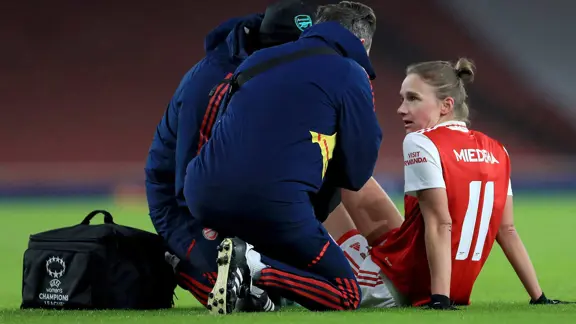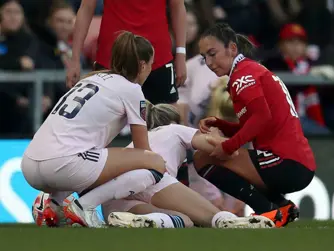News
New FIFPRO report shows increased workload, travel and insufficient rest in women’s football is making players more susceptible to injuries – including ACL injuries

- The review explores data from players in top leagues of England, France, Germany and Spain across the 2021/22 and 2022/23 seasons
- It illustrates how those playing and travelling more for club and country are more susceptible to lower limb injuries
- Women's players who sustained ACL injuries travelled further, for longer and crossed more time zones than non-injured players
New FIFPRO research indicates that increased demands on professional women’s football players has resulted in a notable increase in knee, thigh, hamstring and anterior cruciate ligament (ACL) injuries.
The recent review, which explores data from players in top leagues of England, France, Germany and Spain across the 2021/22 and 2022/23 seasons, illustrates how those playing and travelling more for club and country are more susceptible to lower limb injuries.
The report, which can be downloaded HERE, shows how of the 139 elite women’s players that were analysed, 58 of them were injured over the 2021/22 and 2022/23 campaigns.
The most frequent injury locations were the knee (32%) and the thigh (29%). Twelve injuries were ACL injuries (14%) and 19 hamstring injuries (23%).
ACL injuries have particularly been under the spotlight in women’s football in 2023. Alexia Putellas made her return to play in April 2023 after an ACL injury sustained in July 2022, while other international players such as Marie-Antoinette Katoto, Catarina Macario, Beth Mead, Vivianne Miedema, and Leah Williamson missed the 2023 Women’s World Cup due to picking up ACL injuries.
The analysis shows that elite women’s players who sustained ACL injuries made more appearances, had more instances of less than five days between matches, and had less rest time in the 28 days prior to the injury compared to non-injured players.
The professional women's footballers who sustained ACL injuries also travelled further, for longer and crossed more time zones than non-injured players.
FIFPRO Chief Medical Officer Prof Dr Vincent Gouttebarge led the research and report alongside FIFPRO’s Sport Sciences Consultant Dr Steve den Hollander.
Prof Dr Gouttebarge said: "It is the first time that we have related data on FIFPRO’s Player Workload Monitoring tool with injury data. Even if this data is not as robust as we would like, our research shows that match congestion in women’s elite football is associated with a higher frequency of injuries, especially ACL injuries.
"Not only should a better-balanced match calendar be coordinated among all international and national stakeholders, travel demands and quality of multi-disciplinary teams who are managing players also need to be considered to provide footballers with healthy playing conditions."
Match Workload, Travel and Injuries in Elite Women's Football

A balanced calendar that puts players first is needed
Speaking to FIFPRO earlier this year about her ACL injury, Alexia Putellas highlighted the need to improve conditions for elite women's players.
The Barcelona and Spain midfielder said: "The conclusion that I’ve drawn from this injury, from the experience that I've had, is that it's a multi-factorial injury. That's why it's so important to improve the conditions for women’s players: rest, travel, the surfaces on which we play and, of course, all those studies.
"It is only recently that women’s players have started to become professionals in this sport, and there has hardly been time to carry out these types of studies and learn a little more about the body of women’s footballers or women’s athletes, because it is clear that it’s a different body to a man's. I think these are things that need to be improved."
Arsenal and England striker Beth Mead made her return to play in October 2023 after 11 months out with an ACL injury.
Speaking to FIFPRO earlier this year, Mead said: “It's important we, as a collective, try and get more done for research into ACL injuries. It’s way too common in the women’s game.
"It’s important for us to drive the different factors and aspects around why it’s happening so often and it will be something that we’ll be delving into to try and get to the bottom of it."
In February 2024, FIFPRO will launch its own athlete-centric research into ACL injuries in professional women’s football.
